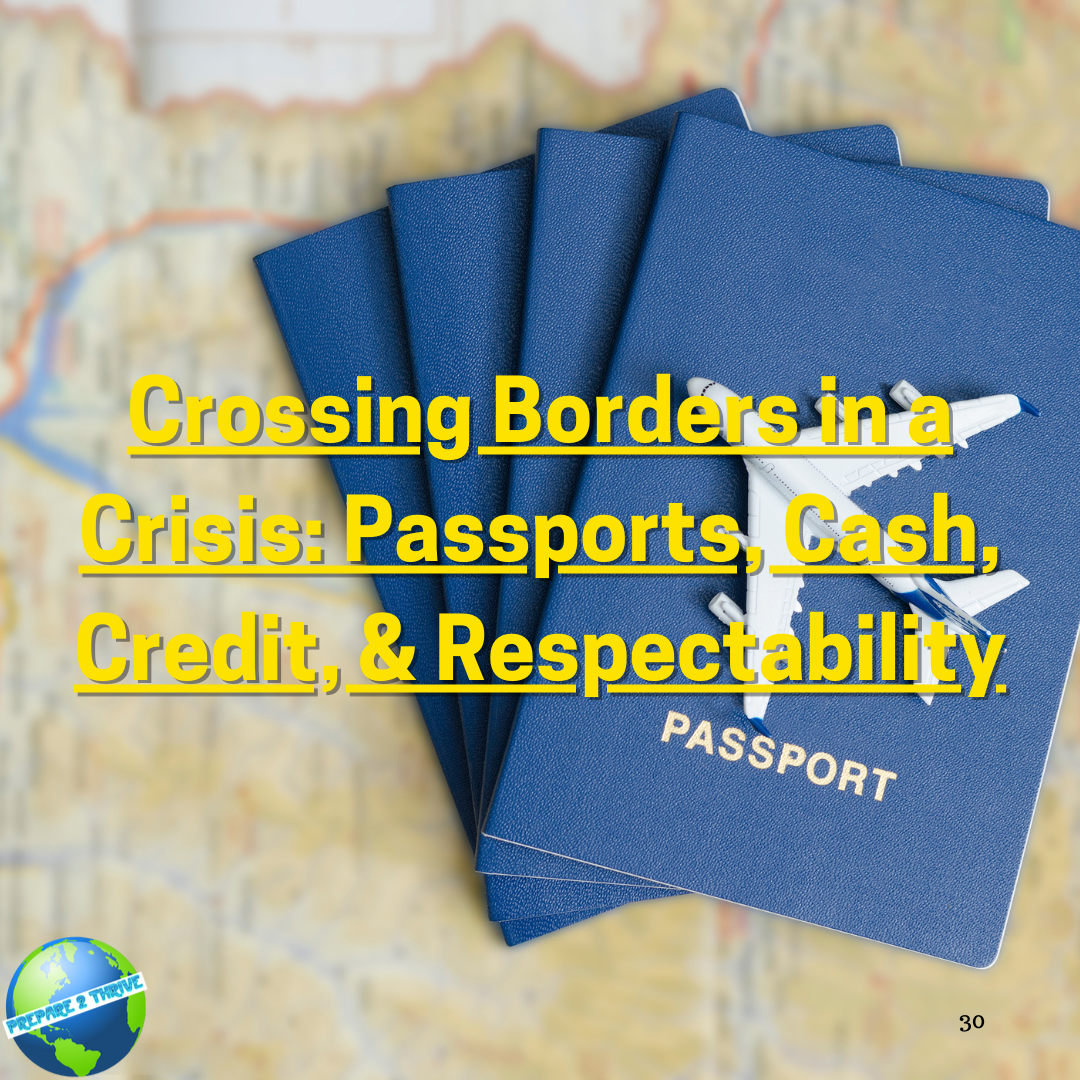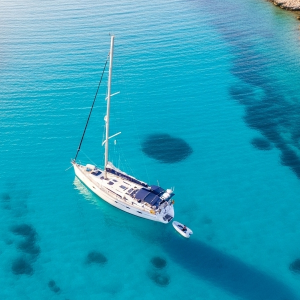Guest article by Penrod
We recently sent in our passports for renewal. While we don’t do a lot of international traveling- maybe once in 5 years or so- we do keep our passports up to date. Ours expire in August, and since some countries won’t allow entry on a passport with less than six months left on it, it was time to renew. Yes, that does mean that for certain purposes, like entry to another country, passports for practical purposes expire six months before they say they do.
It is true that if things are so bad in the US that we must flee the country, other places may be worse, or may simply refuse Americans entry. On the other hand, getting from Point A in the US to Point B in the US MIGHT require crossing a border. I used to drive from Wisconsin to New England every summer. I usually took the US route, but once I tried the Canadian route. That is where a passport would be critical: it provides route options not open to people who don’t have passports.
Avoiding a problem area in the US might require a circuitous route, either by driving or flying into another country. If one wanted to get from New England to Idaho during a major breakdown in which the entire Midwest was already in chaos, it might be safer/faster to either drive or fly through Canada. Circumstances at the time would dictate that of course, but not having a passport closes off the option.
 Or suppose you are in Florida when something terrible happens there: You must get out of the area NOW. All the flights to domestic destinations are filled with panicked travelers, but there are seats open to Mexico City, Belize, and Toronto, and from there you can get to your US destination. Do you consider those options? Not if you don’t have a passport with you.
Or suppose you are in Florida when something terrible happens there: You must get out of the area NOW. All the flights to domestic destinations are filled with panicked travelers, but there are seats open to Mexico City, Belize, and Toronto, and from there you can get to your US destination. Do you consider those options? Not if you don’t have a passport with you.
When we got out of Lebanon in 1975, what is now known as the Battle of the Hotels* had been going on for a week, eventually killing 500 and wounding over 1200 in downtown Beirut.
I was able to quickly get a flight to my preferred destination -Tehran-, but everyone else, who were on their way to the US, simply took “Any flight out of here to a safe place.” That turned out to be Rome, as I recall.
After they got to Rome they got tickets onward and made their way home, but getting out of Beirut TODAY was the primary consideration: ANYWHERE else, Right Now! The road to the airport had been under sniper fire for the week before we left, and the airport was mortared the day after we got out, so this was not foolish haste. Spending the night in Beirut was not a viable option: the hotels were occupied by opposing forces which were shooting at each other with heavy machine guns, mortars, and rockets. The luxury hotel district had become what we would refer to as “a really bad neighborhood.”
At the same time, many Lebanese who could afford it sent their families to other countries to avoid the fighting. They had to have passports to do so. Getting those might not be possible during a breakdown: They had to have them ahead of time.
So, since we do use passports from time to time, we make a point of keeping them up to date, even if we have no current plans to travel outside the US.
Related to passports are cash, credit cards, and respectability. In a crisis, you will need all four to cross a border.
In an extreme crisis, we might need to throw money at a problem. That is where it is extremely important we have at least one credit card with plenty of credit available, and ideally enough cash and/or travelers checks to convince an immigration official in another country to let us in. We will likely also need either a credit card or a lot of cash for an emergency ticket. We might be in a situation where none of those do us any good, but if we need them and don’t have them, the best options close.
Back in the 1970s, I arrived in London looking a bit scruffy. While dapper young men got waved through, the immigration official demanded I prove I had sufficient funds to support myself. Fortunately, I had plenty of travelers checks and an American Express card. He limited my stay to 30 days, but he did let me in.
I was a bit of a slow learner, as I flew from Bangkok to Honolulu looking….not exactly scruffy, mind you, but wearing Indian white cotton pajamas, flip flops, several silver necklaces and bracelets, a very spiffy blue shoulder bag from Burma with a Wheel of Nirvana embroidered on it, and a small book bag for luggage. I then presented a passport filled with drug country entrance and exit stamps.
Do I need to tell you that everything I had was gone over rather thoroughly, including hauling a couple things off for laboratory analysis while I waited? No Grey Man stuff here: I had managed to get their attention.
I was clean, I was a returning citizen, I eventually got in. What if I had been trying to fly into Canada or Europe though? Would I have gotten in? What if it was during a major breakdown? Look respectable when crossing borders, and be squeaky clean. That’s good policy anytime, of course: no matter how depraved you may actually be, try to look normal for the area. Go Grey Man.
Another time I came down with infectious hepatitis in the ethnic Tibetan area of northern India and decided the best course was to fly home via London.
This was a bit of a personal crisis, so I wanted to be as respectable as possible going through ALL airports and immigration stations. Grey Man, that’s me.
I went to the bazaar, got a short haircut, bought some cheap dark slacks, a collared shirt, and some dark glasses to hide my screaming yellow eyeballs, ditched my Indian pajamas, and had no problems with either airlines or the immigration authorities in New Delhi or London.
When I eventually arrived in US Customs in Chicago wearing the same slacks and collared shirt, Mr. Customs man looked at my passport with two sets of additional fold out accordion pages covered with stamps from every major drug country from Morocco to Thailand and demanded to know what I had been doing on my trip. I looked him in the eye and confidently said “Trout fishing.”
He demanded to see my fishing gear. Guess what? I actually had a little telescoping fishing rod, a small reel, and lures in my shoulder bag because I really had gone trout fishing in Northern Pakistan. I still had my Pakistani fishing license. I was respectably dressed. I had been engaged in a respectable activity and could prove it. I was respectable. He let me in without any further questions.
So my policy since has been to keep my passport up to date, stay clean cut, keep plenty of available credit on the card, plenty of cash, and be very polite to Customs officials. In a major crisis, all of those things might be the difference between getting through, and being in very deep kimchi**.
* If you are interested, Wikipedia has a decent account of the battle. Just plug “Battle of the Hotels” into the search field.
** Kimchi is Korean spicy fermented cabbage and vegetables. Deelish, but you don’t want to dive into a vat of it.
For pictures of the hotels after the battle, Google Image search for “battle of the hotels Beirut” or “Holiday Inn battle of the hotels Beirut” When the battle started, those hotels were operating and occupied. The hotels got seriously chewed up: they just were not designed against rockets. What would you do to escape AFTER your hotel had been taken over and rockets were coming through the walls? Would you want a passport, cash, credit, and respectability?




